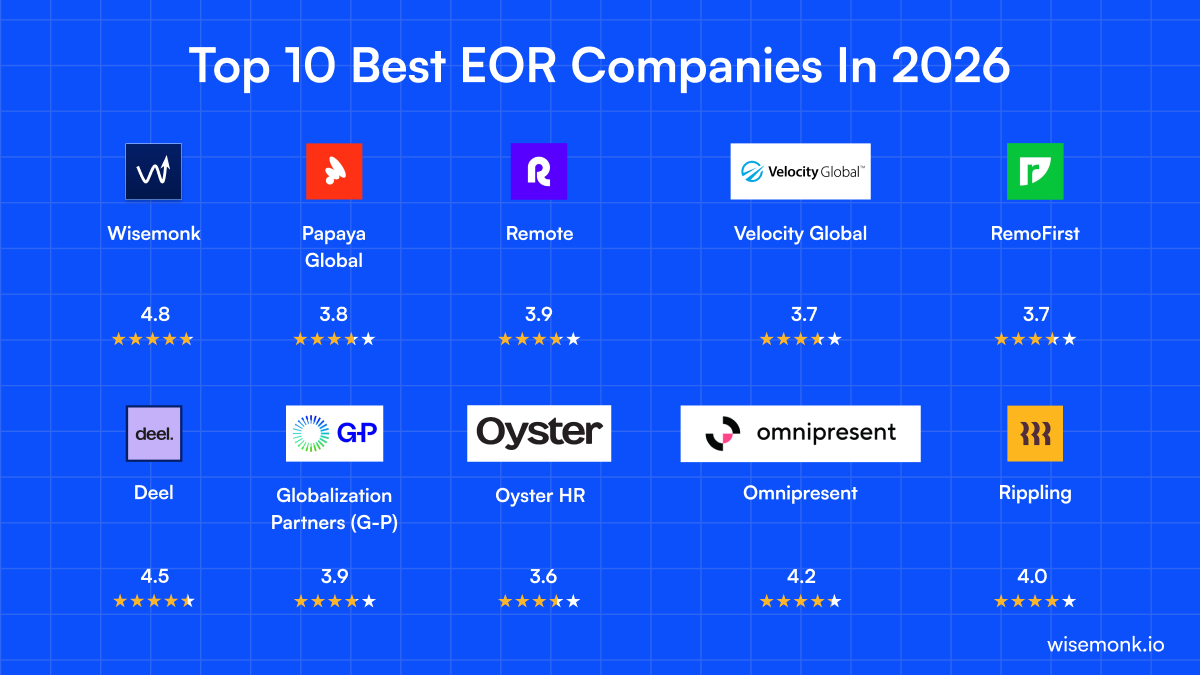Looking to expand your team fast and compliantly in Colombia with an employer of record? An employer of record (EOR) in Colombia makes hiring local talent easy by handling employment laws, payroll, and benefits administration. In our experience supporting global companies, EOR services simplify expansion into Colombia’s growing market, helping you scale quickly and stay fully compliant.
What are the essentials of Colombia’s employment law framework?[toc=Employment Law Framework]
Hiring in Colombia comes with clear rules and recent updates. Here’s a quick overview based on our experience and the latest legal changes:
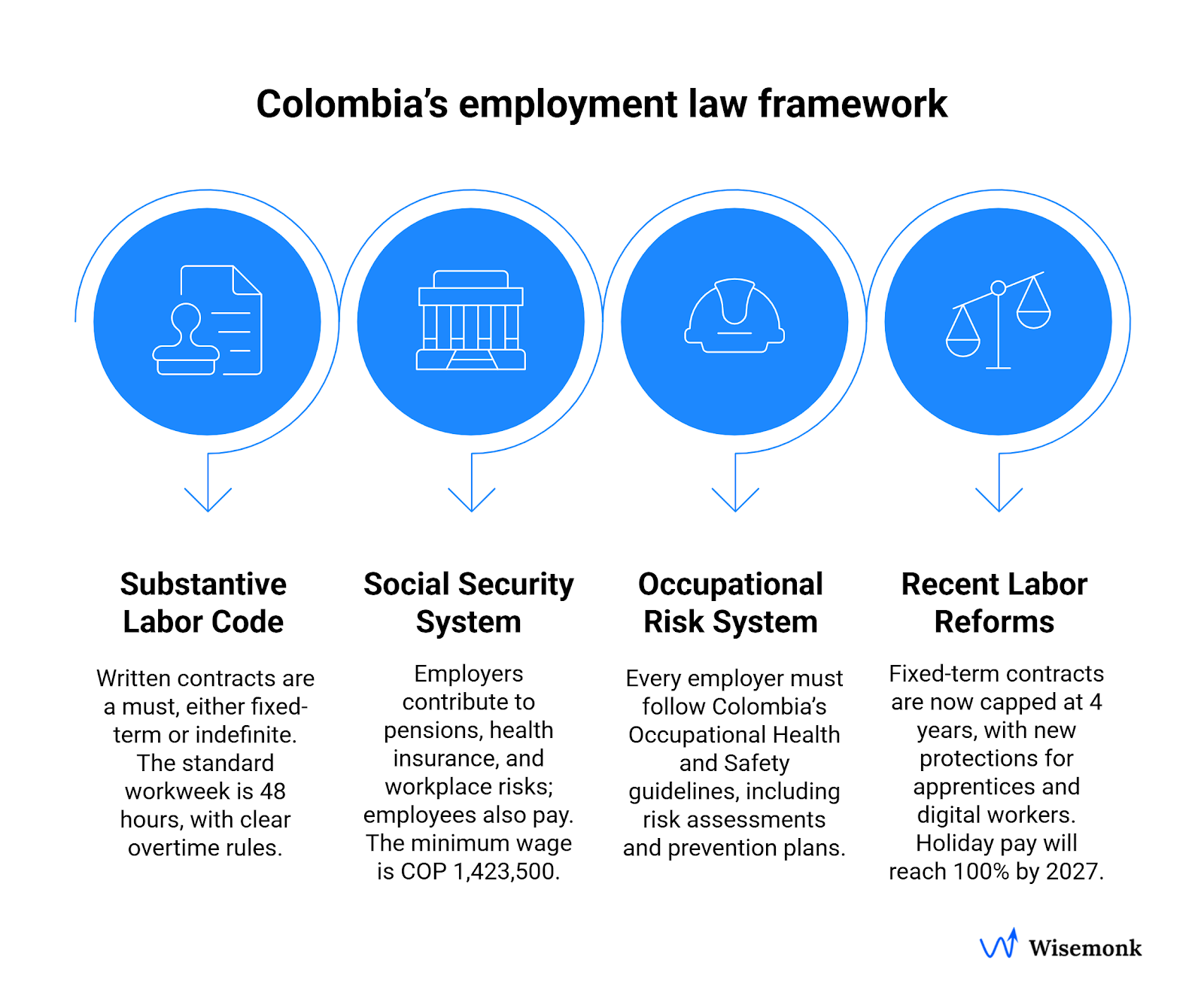
- Substantive Labor Code: Written contracts are a must, either fixed-term (up to 4 years) or indefinite. The standard workweek is 48 hours, with clear overtime rules. Probation can be up to 2 months. Termination and severance pay are strictly regulated for fairness.
- Social Security System: Employers contribute about 20.5% of salary to pensions, health insurance, and workplace risks; employees pay 8%. As of 2025, the minimum wage is COP 1,423,500. New laws improve pension and healthcare benefits for all.
- Occupational Risk System: Safety is non-negotiable; every employer (even with just one worker) must follow Colombia’s Occupational Health and Safety guidelines, including risk assessments and prevention plans.
- Recent Labor Reforms (2025): Fixed-term contracts are now capped at 4 years, new protections for apprentices and digital workers, holiday pay will reach 100% by 2027, and employers must keep detailed overtime records.
These rules are designed to boost job security, align with international standards, and keep employment fair for everyone.
What are the key benefits of using an Employer of Record (EOR) in Colombia?[toc=Key Benefits of Using an EOR]
If you’re wondering why so many companies choose an EOR to enter Colombia, here’s a quick overview from our experience.
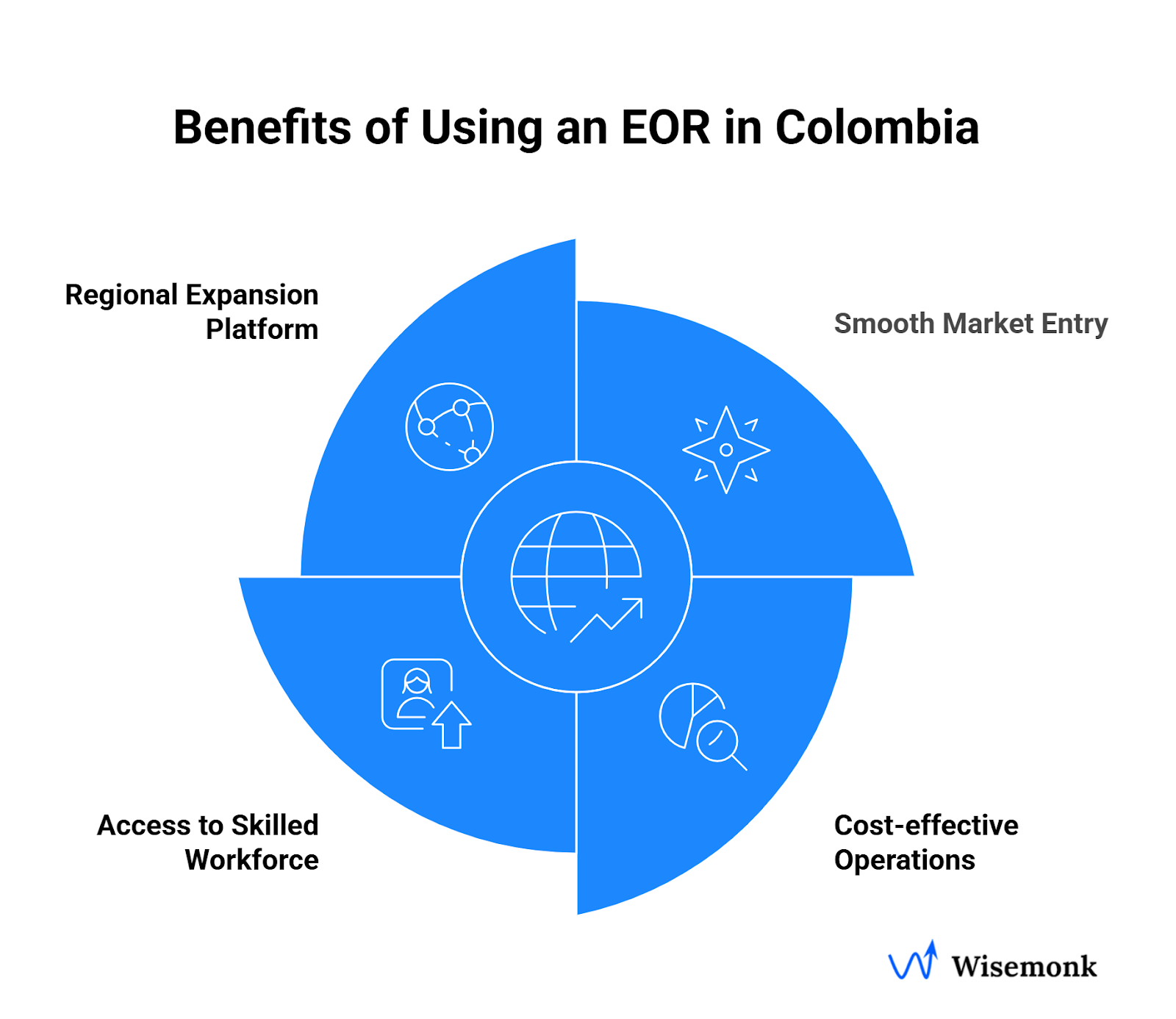
- Smooth Latin American Market Entry: An EOR lets you hire Colombian employees without setting up a local legal entity, speeding up expansion.
- Cost-effective Operations: Avoid costly local infrastructure and administrative overhead.
- Access to Skilled Workforce: Tap into Colombia’s growing talent pool with compliance and payroll handled for you.
- Regional Expansion Platform: Use Colombia as a base to grow across Latin America seamlessly.
In our view, partnering with an EOR removes legal and administrative hurdles, letting you focus on growing your business.
How does payroll and tax compliance work in Colombia?[toc=Payroll & Tax Compliance]
Payroll and tax compliance in Colombia may seem complex, but understanding the basics makes it manageable. Based on our experience supporting companies with global payroll Colombia, here’s a clear overview:
- Colombian Tax System: Employers must withhold income tax from employees, with rates up to 39%. Corporate tax is 35% for local legal entities. All salary payments, bonuses, and benefits are subject to Colombian tax laws and must be reported as taxable income.
- Social Security Contributions: Employers and employees contribute to pensions, health insurance, and occupational risks. In 2025, employers contribute about 20.5% and employees 8% of the employee’s salary. This applies to both indefinite term and fixed term contracts.
- Parafiscal Contributions: Employers pay an additional 9% of payroll for the Family Compensation Fund, National Learning Service (SENA), and Colombian Family Welfare Institute (ICBF). This is mandatory, regardless of whether payroll is managed by an EOR or a local entity.
- Monthly and Annual Filings: Employers file monthly payroll taxes, social security, and parafiscal contributions through DIAN’s e-system. Annual reports summarize these payments and declarations. Using an employer of record ensures full compliance and timely filings.
What employee benefits and entitlements are required under Colombian labor regulations?[toc=Employee Benefits & Entitlements]
Understanding employee benefits is key to staying compliant and competitive in Colombia’s labor market. Based on our experience as a leading EOR service provider, here are the essential benefits every employer must provide.
- 13th Month Salary (Prima): Employees receive an extra monthly salary paid in two installments annually, typically in June and December, as mandated by Colombian labor laws.
- Vacation Bonuses: In addition to 15 days of paid annual leave, employers often provide vacation bonuses to enhance employee satisfaction.
- Transportation Allowances: Employees earning up to two times the minimum wage must receive a monthly transportation allowance to cover commuting costs.
- Severance Fund Contributions: Employers contribute monthly to the severance pay fund (Cesantías), which employees can access under specific circumstances, such as contract termination or education.
- Health Insurance & Social Security: Mandatory health and pension contributions are part of employee benefits, ensuring workers receive statutory benefits including sick leave, paid maternity leave, and paternity leave.
These benefits are governed by the Colombian labor code and enforced to protect employee rights and uphold fair labor practices.
What is the hiring and onboarding process in Colombia?[toc=Hiring & Onboarding Process]
Getting new talent on board in Colombia is a structured process, but it’s straightforward when you know the key steps. In our experience, following a clear process ensures both legal compliance and a positive experience for new hires.
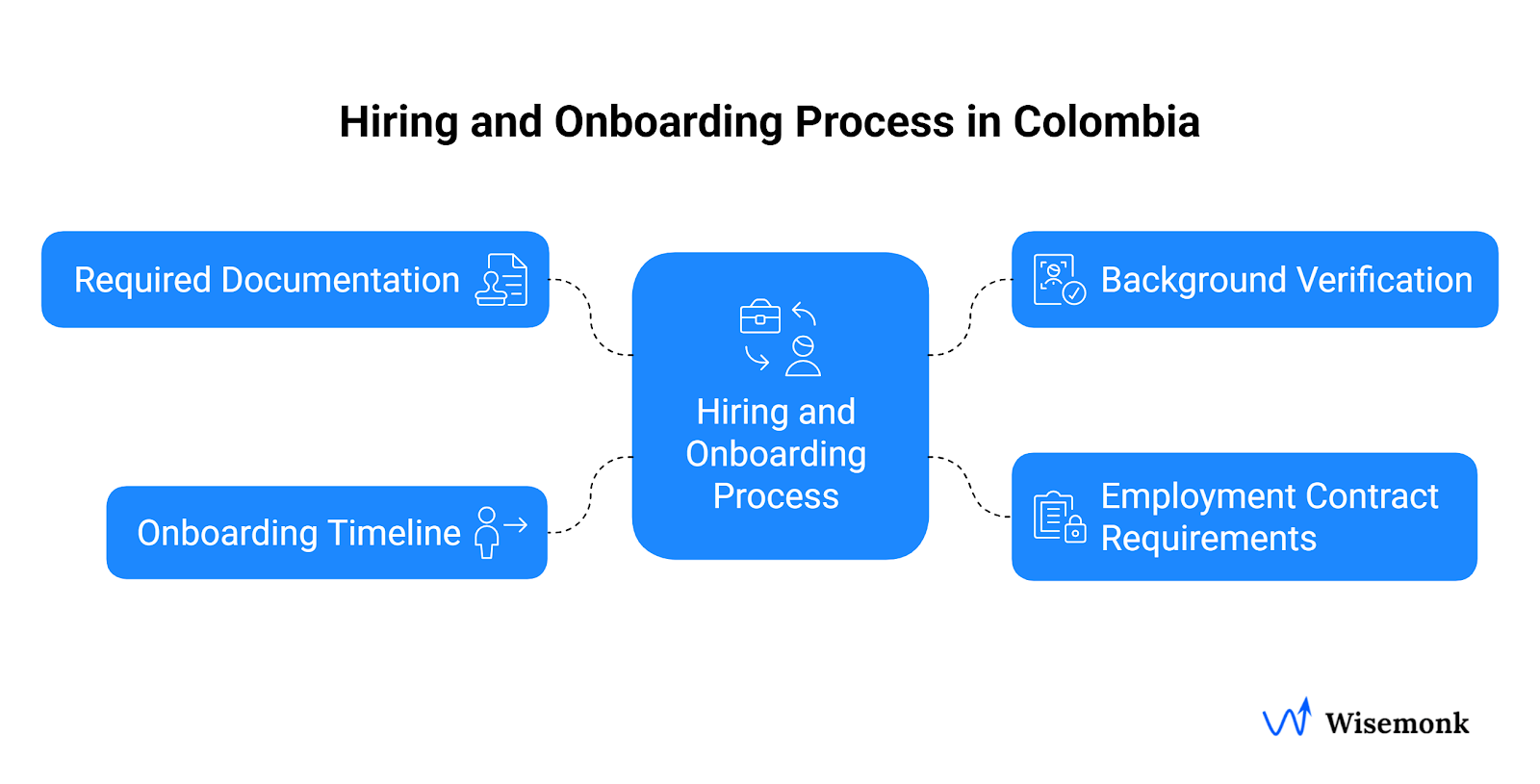
- Required Documentation: Start with collecting a national ID or passport, proof of address, tax ID (NIT), academic certificates, and employment history. For foreign nationals, secure the necessary work permits and visas.
- Background Verification: Consent is required before running background checks, which include verifying identity, education, work history, criminal records, and references. This step is essential for compliance with Colombian labor regulations and privacy laws.
- Employment Contract Requirements: Every hire needs a written employment contract (in Spanish) specifying job title, salary, working hours, start date, contract type (fixed or indefinite term), and a probation period (up to 2 months). Contracts must comply with the Colombian labor code.
- Onboarding Timeline: Registration with social security (health, pension, and occupational risk funds), payroll setup, and benefits enrollment must be done before or on the first day. Orientation, introduction to the team and policies, and job-specific training typically follow in the first week.
We’ve found that a smooth onboarding, covering contracts, legal compliance, and integration, sets the stage for a lasting employment relationship.
How do you manage a workforce in Colombia?[toc=Workforce Management]
Managing a Colombian workforce means blending respect for hierarchy with warm, personal relationships. Based on our experience, these points are key:
- Work Culture: Colombians value trust and friendliness alongside formality. A good work-life balance is important for employee satisfaction.
- Communication: Clear, respectful communication is expected, with a mix of formal titles and informal chats. Face-to-face interactions build strong rapport.
- Performance Management: Regular feedback and goal setting motivate teams. Public recognition is highly valued.
- Professional Development: Offering training and growth opportunities boosts engagement and retention.
This approach ensures compliance with Colombian labor laws while creating a motivated, productive workforce.
What are the termination procedures under Colombian labor laws?[toc=Termination Procedures]
Ending an employment relationship in Colombia requires careful adherence to legal rules to avoid penalties. Here’s a brief guide, based on our experience navigating Colombian labor regulations.
- Just Cause Dismissal: Employers must have a legally valid reason (like serious misconduct or repeated breaches) to dismiss an employee without severance pay. The reason must be well documented and communicated clearly.
- Severance Pay Calculations: If dismissed without just cause or contracts end, employers pay severance based on the employee’s salary and length of service. For indefinite-term contracts, severance equals 30 days of salary for each year worked, prorated monthly. Fixed-term contracts end without severance if the term expires normally.
- Notice Requirements: Usually, employers must give 15 days’ written notice before termination, except in cases of just cause dismissal. Failure to notify can increase severance liabilities.
- Legal Risk Mitigation: Keeping detailed records of performance issues, following written procedures, and seeking legal advice help reduce risks. Using an employer of record Colombia ensures compliance and minimizes disputes.
Following these steps aligns with the Colombian labor code and protects both employer and employee rights.
How does cost analysis and financial planning for an Employer of Record in Colombia work?[toc=Cost Analysis & Financial Planning]
Cost analysis and financial planning for EOR services in Colombia is all about clarity and compliance. Here’s what matters most:
- EOR Service Pricing Models: Most EOR providers charge a monthly fee per employee, typically $599–$2,000, or between 8%–15% of the employee’s salary. Factors like number of employees, contract type (fixed term or indefinite term), and extra employment agreements or statutory benefits can adjust rates.
- Social Security & Parafiscal Costs: Employers must budget about 20.5% of an employee’s salary for social security contributions (covering health insurance, pensions, and labor risks), plus 9% for parafiscal funds (Family Compensation Fund, SENA, ICBF). These costs are required for full legal compliance and apply to all local entities and EOR arrangements.
- Benefits and Allowance Planning: You’ll also need to plan for mandatory benefits, like annual leave, the 13th month salary, transportation allowance, health coverage, and severance pay, as defined under the Colombian labor code and employment contracts. These statutory benefits are essential for compliance and managing payroll effectively.
- ROI and Budget Decisions: Though EOR service fees may seem significant, having the EOR handle local tax, payroll management, and compliance lowers your risk of fines and costly errors and removes the hassle of forming a local legal entity. Most companies find the ROI strong, especially for short-term projects or when hiring international employees.
In our experience, accurate cost analysis and financial planning using an EOR lets you focus on growth, keeping payroll, social security contributions, and tax obligations predictable and compliant with Colombian labor regulations.
What are the common challenges and solutions with Employer of Record (EOR) services in Colombia?[toc=Challenges]
Hiring through EOR services Colombia comes with a few hurdles, but they’re manageable with the right approach:
- Complex Benefit Calculations: Statutory benefits, like the 13th month salary, severance pay, and social security contributions, are tightly regulated. Teaming up with an EOR that knows the Colombian labor code ensures accurate payroll management and legal compliance.
- Cultural Integration: Since the EOR is the legal employer, connecting employees can be tough. We’ve found that strong onboarding, clear communication, and regular feedback help teams stay engaged.
- Regulatory Compliance: With evolving Colombian employment laws, staying compliant takes vigilance. An experienced EOR keeps you up to date and handles payroll taxes and benefits under current labor regulations.
- Currency and Payroll Issues: Payroll demands precision, especially with currency fluctuations and minimum wage updates. A robust EOR system ensures timely, transparent salary payments.
Choosing the right EOR partner helps companies avoid costly errors, simplifies employment agreements, and keeps workforce management fully compliant.
Conclusion[toc=Conclusion]
Expanding into Colombia’s dynamic market doesn’t have to be complicated. Employer of Record (EOR) services in Colombia are the fastest, safest way to grow your international team, especially in a constantly evolving legal landscape.
EOR services in Colombia allow you to:
- Hire and onboard quickly, no need to set up a local entity or decipher complex tax rules.
- Stay 100% compliant with Colombian labor laws, handling payroll, contracts, social security contributions, and statutory benefits without risk of missteps or penalties.
- Reduce administrative headaches while focusing your time and resources on business growth, not legal paperwork or payroll complexities.
- Attract and retain talent, offering locally competitive employee benefits and a smooth onboarding experience, even amid significant labor law reforms.
Of course, choosing the right EOR partner matters: look for deep local expertise, clear pricing, and strong support to navigate challenges like benefit calculations, legal changes, and payroll in local currency.
In summary, partnering with a trusted employer of record in Colombia means less risk, less hassle, and more speed in building your workforce. In our extensive experience, this approach not only streamlines your entry to the Colombian labor market but sets you up for long-term, compliant success across Latin America.
Ready to expand your global workforce quickly and compliantly? Partner with Wisemonk’s Employer of Record services to effortlessly manage hiring, payroll, and compliance, so you can focus on growing your business with confidence.
Frequently asked questions
What is the 13th-month salary in Colombia?
The 13th-month salary (prima) is mandatory and paid in two equal parts, by June 30 and December 20 each year, to all employees.
How are severance payments calculated?
For indefinite contracts, severance is one month’s salary for the first year plus 20 days for each additional year; for high earners (10x minimum wage+), it’s 20 days for the first year and 15 days for each year after.
What are the work visa requirements?
You need a valid passport, signed job contract, employer sponsorship, academic/professional credentials, and proof of funds; processing typically takes 5–10 business days.
How long does it take to hire through EOR in Colombia?
Hiring via EOR generally takes less than one week, much faster than setting up a local entity, which can take several months.
What are the mandatory benefits for Colombian employees?
Employers must provide healthcare, pension, labor risk insurance, severance fund, paid annual leave, and a 13th month salary; transportation allowance applies for lower earners.
What is the Employer of Record in Colombia?
An Employer of Record (EOR) in Colombia is a third-party company that legally hires and manages employees on behalf of another business, handling payroll, taxes, and local labor compliance.
What is an Employer of Record company?
An EOR company legally employs workers for other businesses, managing payroll, taxes, benefits, and compliance, allowing companies to hire staff without setting up a local entity.
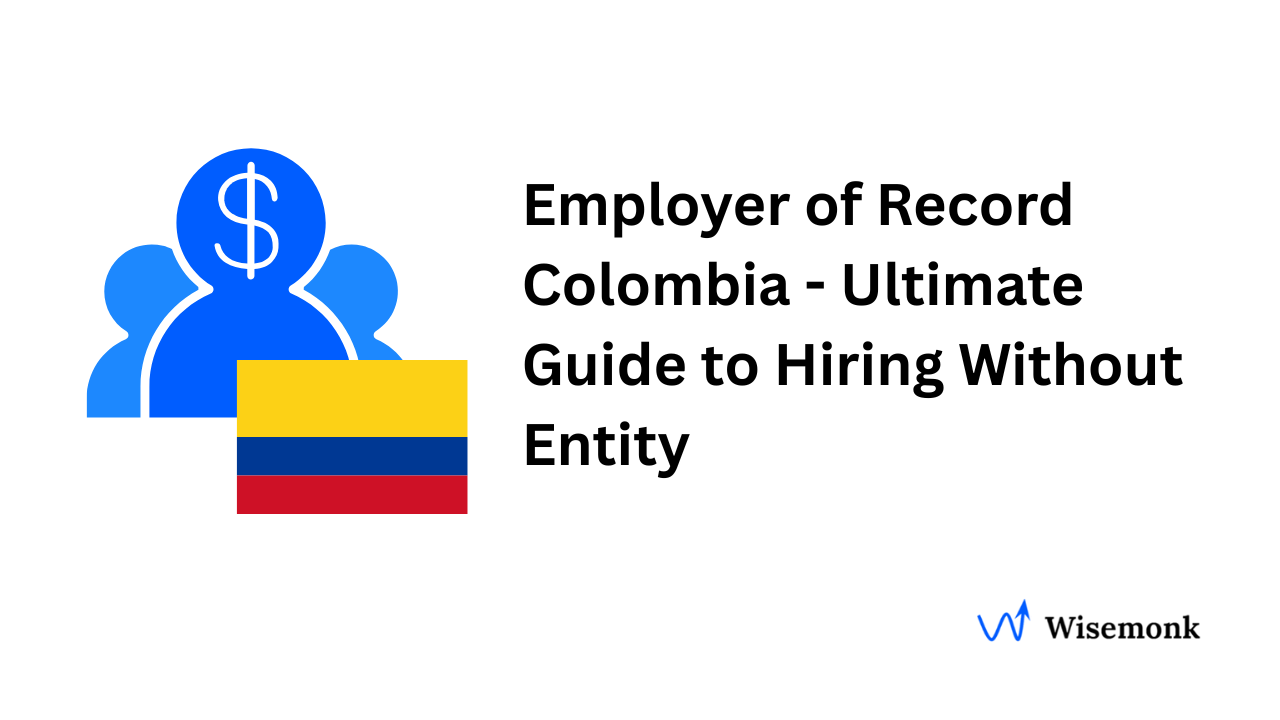
.png)
%20(1).webp)
